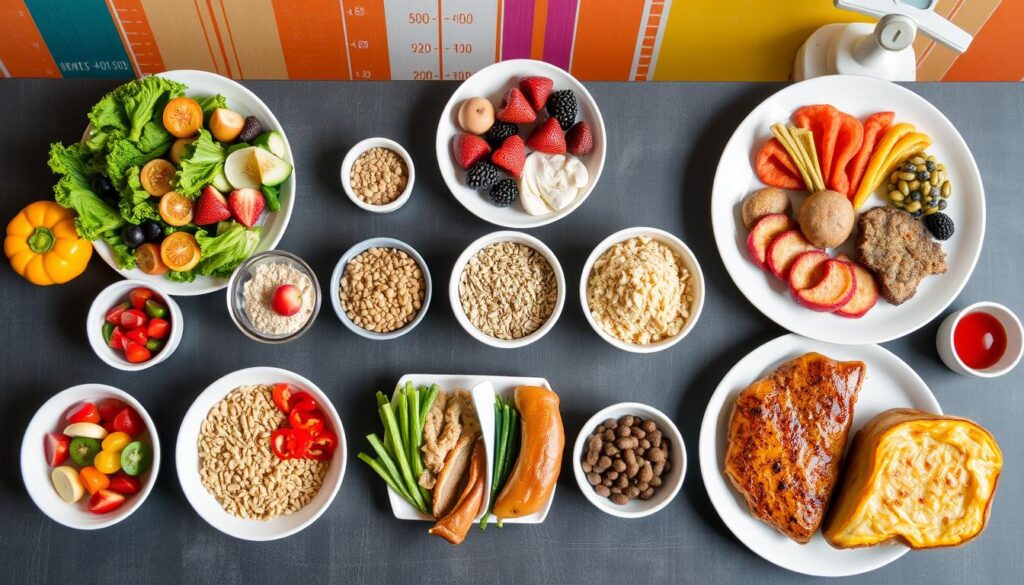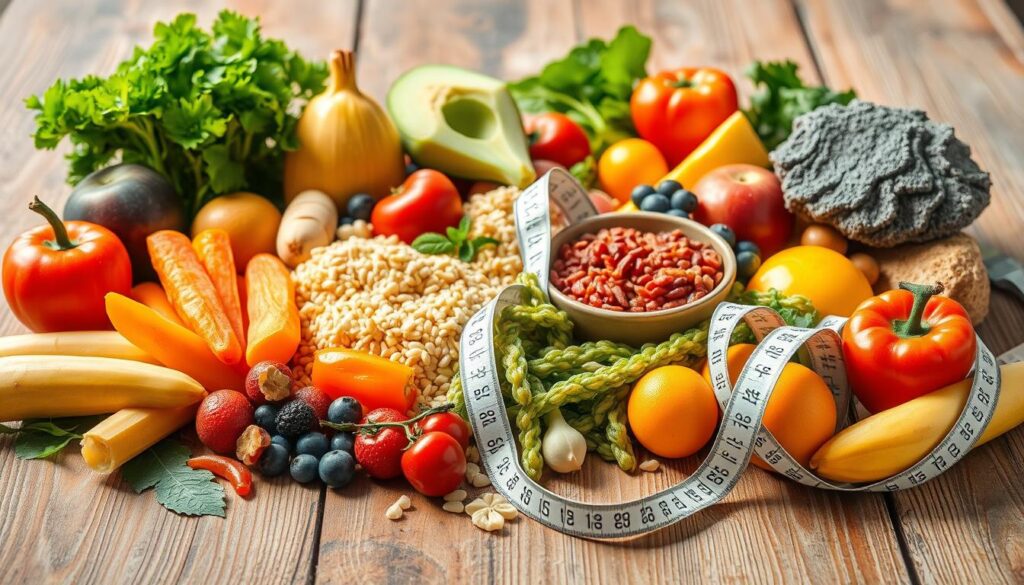Many people try to eat less to lose weight. This can work for a while. But, to keep weight off for good, you need a bigger plan. This guide will show you how to eat right and lose weight for good.
Key Takeaways
- Calorie reduction can lead to short-term weight loss, but long-term success requires a holistic approach.
- Understanding your metabolism and creating a sustainable calorie deficit are essential for weight management.
- Developing healthy eating habits, portion control, and mindful eating strategies are key to maintaining weight loss.
- Combining diet with physical activity can provide greater benefits for weight loss and overall health.
- Identifying and addressing common mistakes in calorie restriction can help you avoid unhealthy relationships with food.
Understanding the Science Behind Calorie Reduction
Losing weight is simple. You burn more calories than you eat. This leads to a calorie deficit. Your body then uses fat for energy.
This is how you lose weight. But knowing how calorie reduction works helps make a better weight loss plan.
How Your Body Responds to Reduced Calorie Intake
When you eat fewer calories, your body uses fat for energy. This creates a calorie deficit. Your body breaks down fat cells to get energy.
Keeping this calorie deficit is key for lasting weight loss.
The Role of Metabolism in Weight Loss
Your metabolism is very important for losing weight. It’s how your body turns food into energy. A faster metabolism helps you burn calories better.
Things like age, muscle, and how active you are can change your metabolism.
Calorie Deficit Explained
A calorie deficit is when you eat fewer calories than you burn. For healthy weight loss, aim for a 500-calorie deficit each day. This should help you lose about 1 pound a week.
Finding the right calorie deficit is important. It should fit your needs and lifestyle without hurting your health or nutrition.
| Calorie Deficit Examples | Calorie Savings |
|---|---|
| Flavored latte (268 calories) to black coffee (5 calories) | 263 calories |
| Chocolate ice cream (292 calories) to strawberries (69 calories) | 223 calories |
| Lemon-lime soda (210 calories) to sparkling water (0 calories) | 210 calories |
By making small food changes, you can cut calories and help with weight loss. Diet and exercise together are the best way to manage weight.
Can Eating Less Lose Weight: The Basic Principles
Eating less can help you lose weight. But, it’s important to do it in a healthy way. Focus on eating the right amount of food and counting calories. This way, you can lose weight without feeling too hungry.
The basic principles of eating less to lose weight involve the following:
- Calorie Deficit: To lose weight, eat fewer calories than you burn. You can do this by eating a bit less each day. But don’t cut too many calories at once.
- Nutrient-Dense Foods: Eat foods that are full of nutrients. Choose fruits, veggies, whole grains, lean proteins, and healthy fats. These foods will make you feel full and happy.
- Portion Control: Pay attention to how much you eat. Use small plates and eat slowly. This helps you know when you’re full.
By following these tips, you can lose weight in a healthy way. Losing weight is a journey. Be patient, keep going, and be kind to yourself.
| Nutrient | Healthy Eating Guidelines |
|---|---|
| Carbohydrates | 45-65% of total daily calorie intake |
| Protein | 10-35% of total daily calorie intake |
| Fats | 20-35% of total daily calorie intake |
By following these tips, you can lose weight in a healthy way. Remember, slow and steady is the best way to keep the weight off.
Creating a Sustainable Weight Loss Plan
Starting a weight loss journey needs careful planning. It’s important to set realistic weight loss goals, eat healthily, and track your progress. These steps help you make a plan that works for you.
Setting Realistic Weight Loss Goals
For weight loss, aim for a slow and steady pace. Experts say losing 1-2 pounds a week is best. This way, you’re more likely to keep losing weight for good.
Developing Healthy Eating Habits
Good weight loss isn’t about cutting out food. It’s about eating more plant-based foods, whole grains, and lean proteins. Also, controlling how much you eat is key to staying healthy.
Tracking Your Progress Effectively
Tracking your progress is very helpful. Keep a food diary and weigh yourself regularly. Also, log your workouts. This helps you see what’s working and keeps you motivated.
Remember, losing weight is a long-term effort. By setting smart goals, eating well, and tracking your progress, you can achieve lasting results. This will also improve your overall health.
“The key to sustainable weight loss is to make small, gradual changes that you can maintain over the long term.”
The Role of Portion Control in Weight Management
Portion control is key for managing weight. Studies show that bigger portions lead to more food intake. In fact, people eat up to 30% more from the biggest portion than the smallest.
This effect is true for both men and women. A review found that bigger portions mean more energy intake. Women eat up to 31% more, and men up to 56% more from larger sandwiches.
Snack sizes also matter a lot. For example, women eat 18% more and men eat 37% more from a 170g bag of chips than an 85g bag.
| Food Item | Smaller Portion | Larger Portion | Increase in Energy Intake |
|---|---|---|---|
| Deli-style Sandwich | – | – | Women: up to 31% Men: up to 56% |
| Potato Chips | 85g | 170g | Women: 18% Men: 37% |
To manage your portion sizes, use visual cues. A meat serving is like a deck of cards. A grain serving is like a tennis ball. A fat serving is like a pair of dice. Mindful eating helps too. It means paying attention to hunger and enjoying your food.

“The size of pre-packaged snacks significantly influenced energy intake. For example, when served a 170g package of potato chips, women ate 18% more and men ate 37% more compared to when served an 85g package.”
In summary, portion control is vital for weight management. Being mindful of serving sizes and using control strategies helps reach health goals.
Essential Nutrients for Healthy Weight Loss
Shedding extra pounds is not just about cutting calories. The quality of your nutrients is key. A balanced diet should have enough protein to keep muscles strong. It should also have fiber-rich complex carbohydrates for feeling full. And don’t forget healthy fats for hormone balance.
Protein Requirements During Weight Loss
Protein helps keep muscle tissue when you lose weight. Eat lean protein like lean meats, fish, and plant-based options. They help build muscle and keep you full.
Importance of Fiber and Complex Carbohydrates
Fiber-rich complex carbohydrates from whole grains, fruits, and veggies are vital. They give you long-lasting energy and support gut health. They also help you feel full longer, so you don’t overeat.
Healthy Fats for Weight Management
Healthy fats like those in avocados, nuts, and olive oil are good for weight loss. They help control hormones, support brain function, and keep you satisfied between meals.
By focusing on these nutrients, you can make a weight loss plan that’s good for your body. It will help you reach your health goals.
“Proper nutrition is the foundation for a healthy weight loss journey. Prioritize protein, fiber, and healthy fats to fuel your body and achieve lasting results.”
Mindful Eating Strategies for Success
Getting to a healthy weight is more than just eating less. Mindful eating helps you make better food choices. It makes you think about why, how, when, where, and what you eat. This way, you can make choices that help you succeed in the long run.
Eating slowly is a big part of mindful eating. Eating slowly helps you feel full sooner. It also makes you enjoy your food more. This means you’re less likely to eat unhealthy snacks later.
It’s also important to listen to your body’s hunger and fullness signals. Don’t eat based on how much food is on your plate or by the clock. Tune in to your internal signals to eat right.
Another key part is to eat without distractions. Don’t eat while you’re working or watching TV. This helps you be more aware of what and how much you’re eating.
| Mindful Eating Strategies | Benefits |
|---|---|
| Eat slowly, savor each bite | Promotes feelings of fullness, enhances enjoyment |
| Pay attention to hunger and fullness cues | Prevents overeating, maintains healthy relationship with food |
| Reduce distractions during meals | Increases awareness and mindfulness around eating |
Using these mindful eating strategies can help you manage your weight better. It’s not just about the number on the scale. It’s about understanding and caring for your body.
Common Mistakes When Reducing Food Intake
Trying to lose weight by eating less can be tricky. It’s important to cut calories but avoid mistakes. These mistakes can hurt your health and stop you from losing weight.
Signs of Unhealthy Calorie Restriction
One big mistake is eating too few calories. You need some calories to lose weight, but too little is bad. Signs of eating too little include feeling very tired, being grumpy, and not getting enough nutrients. Your body needs nutrients to work right, and not getting them can be very bad.
Avoiding Crash Diets
Another mistake is trying crash diets. These diets promise fast weight loss but often lead to gaining weight back. Crash diets are tempting but don’t work well in the long run. Make slow, healthy changes to your diet for better weight control.
Successful weight loss is not about quick fixes. It’s about making smart, healthy choices you can keep up with. By avoiding these mistakes and choosing a balanced diet, you’ll get closer to your weight loss goals.
Combining Diet with Physical Activity
To lose weight well, you need to eat healthy and move a lot. The American Heart Association says to do at least 150 minutes of exercise a week. This can be walking fast, swimming, or biking.
Studies show that eating right and moving more helps you lose more weight. People who changed their diet and exercise were 17.5 times more likely to lose weight. This is compared to those who only changed one thing.
If you’re new to exercise, start small. Aim for easy goals and slowly get harder. This helps your body get used to it and keeps you going.
“Combining a healthy diet with regular physical activity is key to successful weight loss. The synergistic effect of these two components can help you achieve your weight loss goals more effectively and sustainably.”
Weight loss is a journey. Find what works for you and your life. Small changes in diet and exercise can lead to big success over time.

Managing Hunger and Cravings
Learning to manage hunger is key to losing weight. It’s about knowing when you’re hungry and choosing healthy foods. This helps you avoid cravings and stick to a diet that’s good for you.
Healthy Snacking Options
Healthy snacks are important for controlling hunger. Here are some good ones:
- Fresh fruits like apples, oranges, and grapefruit, which are rich in fiber and antioxidants
- Crunchy vegetables like carrots, celery, and cucumber, paired with a protein-rich dip such as hummus or Greek yogurt
- Handful of nuts or seeds, providing a satisfying combination of protein, healthy fats, and fiber
- Low-fat dairy products like Greek yogurt or cottage cheese, which offer protein to keep you fuller for longer
These snacks can make you feel full and stop cravings for unhealthy foods.
Timing Your Meals
When you eat can also affect hunger. Try to eat balanced meals every 3-4 hours. This keeps your blood sugar steady and stops you from eating too much. Drinking water also helps you feel less hungry.
Adding protein to your meals makes you feel full and happy. Remember, managing hunger and cravings takes time and effort. Listen to your body and make smart choices for lasting weight loss.
| Snack | Calories | Protein (g) | Fiber (g) |
|---|---|---|---|
| Apple with 2 tbsp peanut butter | 250 | 8 | 5 |
| Greek yogurt with 1/2 cup berries | 150 | 15 | 3 |
| 1 oz roasted almonds | 170 | 6 | 3 |
| Carrot sticks with 2 tbsp hummus | 120 | 4 | 4 |
“Hunger is the best sauce in the world.” – Miguel de Cervantes
Creating Long-Term Lifestyle Changes
Getting to a healthy weight is more than just eating less for a short time. It’s about changing your life for good. You need to make small, lasting changes in how you eat, move, and feel.
Setting smart weight loss goals is key. Try to lose 1-2 pounds (0.5-1 kg) each week. Losing weight slowly is better than quick fixes. Even a small weight loss of 5% can make a big difference in your health.
It’s also important to be active every day. Aim for 30 minutes of exercise most days. If 10-minute sessions work better, use them. Getting a treadmill can help you stay active at home.


A Life-Changing Experience with This Weight Loss Supplement (Nagano Tonic)
I’ve always struggled with finding a weight loss solution that actually works for me. Like many, I’ve tried numerous diets, exercise routines, and supplements over the years—some worked for a short time, but nothing ever gave me long-term results. That was until I decided to try the weight loss supplement I found : Link to the Supplement.
From the moment I started using it, I noticed a difference. Not only did I feel more energized, but my cravings also became more manageable. The best part? I started seeing results much quicker than I anticipated! Over the course of just a few weeks, I noticed a significant reduction in belly fat and overall weight loss that I hadn’t been able to achieve before.
What makes this supplement stand out from all the others I’ve tried is how it supports me in my daily routine without any jitters or energy crashes. I’m able to stay focused and motivated, which has made it easier to stay on track with my diet and exercise plan.
This product truly exceeded my expectations, and I feel more confident and healthier than ever before. If you’re struggling with your weight loss journey like I was, I highly recommend giving this supplement a try. It’s been a game-changer for me, and I’m sure it can work wonders for you too!
Contant Them on email .. tonicnagano50@gmail.com
I’ve tried so many weight loss products over the years, but nothing worked like this supplement! Since I started using it, I’ve noticed a big difference in my energy levels and appetite control. In just a few weeks, I’ve lost weight and feel so much better. It’s been easy to stick with, and the results speak for themselves. Highly recommend this to anyone looking to make a real change!
wasn’t sure what to expect, but this weight loss supplement has really impressed me! After just a few weeks of use, I’ve already dropped a few pounds and feel more motivated to stay active. It’s helped curb my cravings and boosted my energy throughout the day. I’m excited to keep going and see even better results. Definitely worth trying!
Reach them on tonicnagano50@gmail.com
I was skeptical at first, but this supplement has truly made a difference in my weight loss journey. I’ve lost weight without feeling deprived or sluggish. My cravings are under control, and I feel more confident in my body. It’s easy to incorporate into my daily routine, and the results speak for themselves. I’m so glad I gave it a try!
Thanks David, i do use the link to make my purchase. you can get too here http://surl.li/iasppy
I’ve tried so many weight loss products, but this one has been by far the most effective. In just a few weeks, I’ve noticed a visible difference in my body and energy levels. It’s helped me stay on track without the constant hunger pangs and cravings. I’m really happy with my progress and can’t wait to see where I’ll be in another month!
This Nagano Tonic has been amazing! In just a few weeks, I’ve lost weight, feel more energized, and my cravings are under control. Highly recommend it!
Thats the link to purchase http://surl.li/iasppy